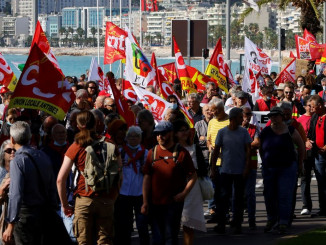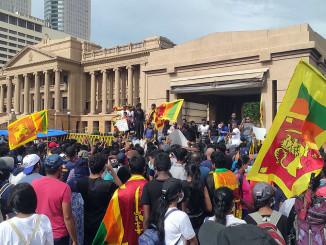The following is just a short list of some of the social struggles that were waged across the world in 2013.
January – France
Hundreds of workers at the Citroen plant in the town of Aulnay north of Paris disrupt production demanding permanent contracts. They are struggling to keep their jobs after the closure of their factory, part of Citroen’s layoff of 8,000 workers.
February – India
For two days starting February 20, workers from all across India went on strike. The strike was only a demonstration of strength, but involved 100 million workers making it the largest strike in human history. Certainly this shows the immense power of the Indian working class if it decides to mobilize its strength all together.
March – Worldwide
Farmers in countries around the world from Argentina to the United States began holding ongoing protests called “March Against Monsanto,”protesting the big agribusiness company who is responsible for the creation and sale of genetically modified foods.
April – Hong Kong
Dock workers at the Kwai Tsing container terminal engaged in a 40 day strike for higher wages were joined by protesters for a mass demonstration on April 7th. The workers won an agreement for ten percent higher wages against the company which runs shipping in 71 ports worldwide.
May – Turkey
Beginning May 28th, For several months in Turkey, there were major protests focused in the capital Istanbul’s Taksim Square over the government’s privatization and handing over Taksim Gezi Park, one of the last remaining public parks, over to urban developers to make it into a shopping mall.
June – Brazil
From June 6-30th in Brazil, there was a massive movement of hundreds of thousands in response to fare increases for public transportation, cuts to other programs and police repression. Brazil is one of the most unequal societies in the world. São Paulo and Rio are among the 15 most expensive cities in the world to live in.
July – Egypt
In early July Egypt saw the biggest mass protests since the Egyptian revolution in 2011. The mass demonstrations were followed by a military coup against the Muslim Brotherhood government led by Muhammad Morsi.
August – U.S.A.
In Washington D.C. over 1,000 people were arrested protesting the Obama administration’s intention to allow the extension of the Keystone XL pipeline, a massive project which would open up the tar sands of Alberta, Canada to oil drilling. Scientists believe this oil extraction would cause a massive release of atmospheric pollution, dramatically increasing global warming.
September – Mexico
From September 14th-20th, Mexican teachers occupied public buildings and shut down access the airport in Mexico City for several hours protesting harsh education cuts and degraded working conditions. For several days, 30,000 teachers and supporters occupied the main public square in Mexico City.
October – Indonesia
From October 31 to November 1st, over 50,000 workers across industries, from textiles to metalwork, went on strike for two days to demand higher pay to cope with the rapidly rising costs of fuel and other living essentials.
November – Ukraine
Protesters begin camping out in the main square of Ukraine’s capital, Kiev. This ongoing protest is in reaction to the government’s relationship with Russia, and the brutal and arbitrary police methods it uses to enforce it’s will. The protests involved over a million people, showing a deep discontent with the current regime.
December – South Korea
From December 9th-30th, close to 8,000 railroad workers, almost one third of the entire staff, were on strike to protest the government’s efforts to begin the process of privatization of the railways. The workers continued to fight despite the government declaring their strike illegal and arresting union leaders and firing teargas in union offices. The movement also sparked protests in the general population against government corruption.




